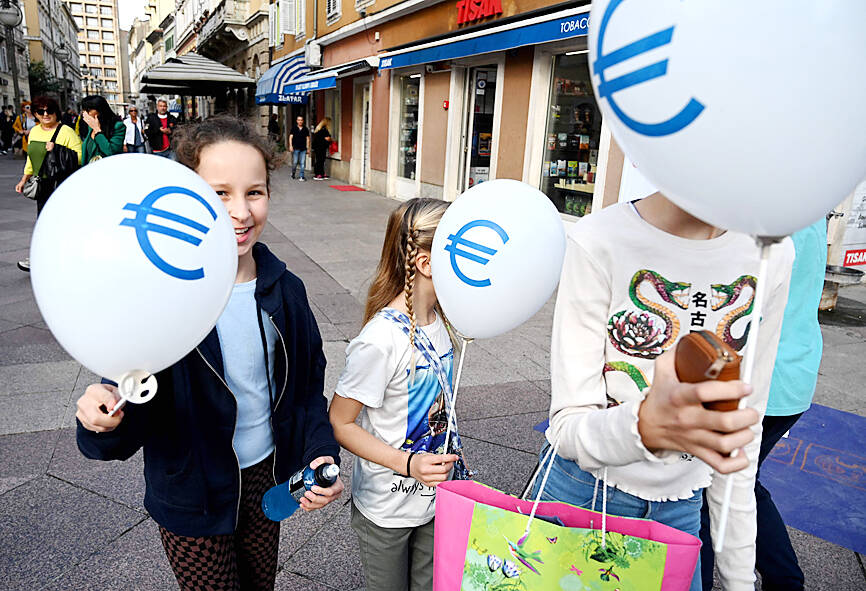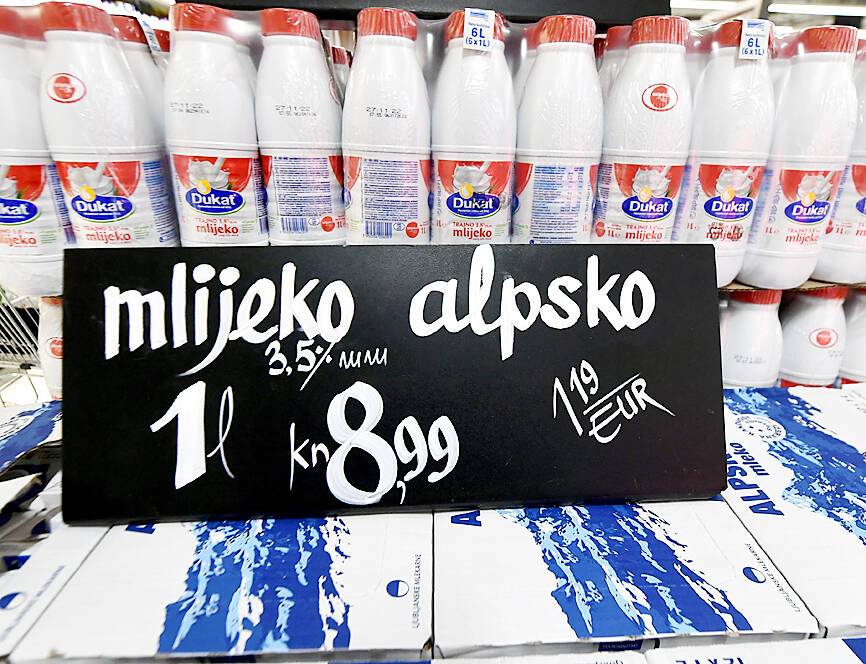More than nine years after Croatia became the EU’s newest member, the country is on a roll to make the most of its status.
Croatia is adopting the EU’s common currency, the euro, and joining the Schengen Area, Europe’s visa-free travel area, on Jan. 1.
Officials in the nation of 4 million people say the developments would be remembered as one of the country’s biggest achievements since it gained independence during the breakup of Yugoslavia 31 years ago.

Photo: AFP
Adopting the euro offers economic benefits stemming from deeper financial ties with the currency’s 19 other users and with the European Central Bank. It also means that the 340 million people who live in the eurozone would no longer need to exchange their euros for Croatian kuna and can enter the country known for its stunning Adriatic coastline without stopping at border controls.
“After 10 years of membership [in the EU], we intentionally and deservedly reached the stage where we would become the only country in history to join the Schengen and eurozones on the same day,” Croatian Prime Minister Andrej Plenkovic said. “Some countries achieved the two goals one after another over a relatively short period of time, but none achieved both on the same day.”
The changes “will have a transformative impact on our economy,” he added.

Photo: AFP
However, not all Croats are so excited by the upcoming changes, especially the phasing out of the country’s currency.
Some are sentimental about the kuna, which was introduced to secure monetary autonomy after Croatia’s split from the former Yugoslavia during the 1991-1995 Croatian War of Independence.
“The kuna was a symbol of Croatia’s independence. We were all attached to it, so it will be a bit hard to get over its disappearance,” said Vladislav Studar, a veteran of the war between the forces of Croatia’s government and those loyal to the Serb-controlled Yugoslav army. “But what can we do? Life goes on,”
Stela Roso, a Zagreb resident, agreed, saying: “It is a bit sad that we will no longer use the kuna because it was unique to our country, but in practical terms, [the currency switch] will make no difference to me.”
Croatia joined the EU in 2013, the last time the country admitted a new member nation. To adopt the euro, the country had to fulfill a set of strict economic conditions, including having a stable exchange rate, controlled inflation and sound public spending.
After EU finance ministers in July gave Croatia the green light to join the eurozone, the country’s central bank had to make extensive preparations.
“We secured the [euro] banknotes for front-loading and the full volume needed for next year, and we are almost done minting the needed 600 million coins. Around 93 percent of that number has already been minted,” Croatian National Bank Currency Area Executive Director Tihomir Mavricek said.
The kuna and the euro would be in dual use for only 14 days, but as people enjoy post-holiday sales next month, they would receive only euros in change.
However, many Croats prepared in advance.
“Since mid-August ... the amount of the kuna in circulation dropped by 12 billion [US$1.7 billion],” Mavricek said. “So we have around two-thirds, or some 22 billion kuna, left to phase out.”

The Philippines yesterday said its coast guard would acquire 40 fast patrol craft from France, with plans to deploy some of them in disputed areas of the South China Sea. The deal is the “largest so far single purchase” in Manila’s ongoing effort to modernize its coast guard, with deliveries set to start in four years, Philippine Coast Guard Commandant Admiral Ronnie Gil Gavan told a news conference. He declined to provide specifications for the vessels, which Manila said would cost 25.8 billion pesos (US$440 million), to be funded by development aid from the French government. He said some of the vessels would

CARGO PLANE VECTOR: Officials said they believe that attacks involving incendiary devices on planes was the work of Russia’s military intelligence agency the GRU Western security officials suspect Russian intelligence was behind a plot to put incendiary devices in packages on cargo planes headed to North America, including one that caught fire at a courier hub in Germany and another that ignited in a warehouse in England. Poland last month said that it had arrested four people suspected to be linked to a foreign intelligence operation that carried out sabotage and was searching for two others. Lithuania’s prosecutor general Nida Grunskiene on Tuesday said that there were an unspecified number of people detained in several countries, offering no elaboration. The events come as Western officials say

A plane bringing Israeli soccer supporters home from Amsterdam landed at Israel’s Ben Gurion airport on Friday after a night of violence that Israeli and Dutch officials condemned as “anti-Semitic.” Dutch police said 62 arrests were made in connection with the violence, which erupted after a UEFA Europa League soccer tie between Amsterdam club Ajax and Maccabi Tel Aviv. Israeli flag carrier El Al said it was sending six planes to the Netherlands to bring the fans home, after the first flight carrying evacuees landed on Friday afternoon, the Israeli Airports Authority said. Israeli Prime Minister Benjamin Netanyahu also ordered

Former US House of Representatives speaker Nancy Pelosi said if US President Joe Biden had ended his re-election bid sooner, the Democratic Party could have held a competitive nominating process to choose his replacement. “Had the president gotten out sooner, there may have been other candidates in the race,” Pelosi said in an interview on Thursday published by the New York Times the next day. “The anticipation was that, if the president were to step aside, that there would be an open primary,” she said. Pelosi said she thought the Democratic candidate, US Vice President Kamala Harris, “would have done